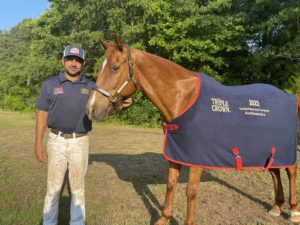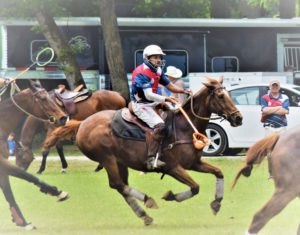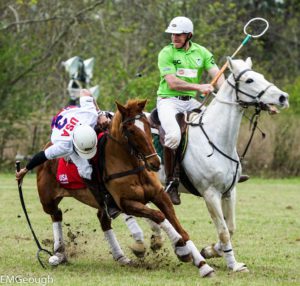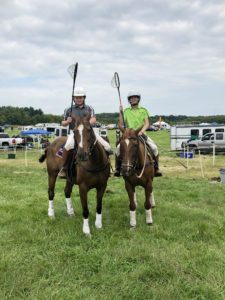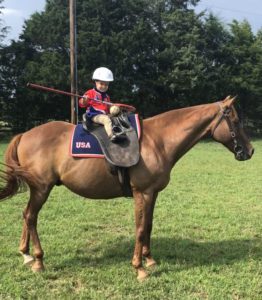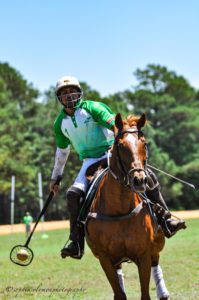This week’s Sunday Spotlight is shining on Keystone Specialist (aka “Special”), who was awarded by Triple Crown as the Overall Champion Best Horse at the Polocrosse in the Pines Tournament in May. The chestnut gelding was also voted Best Horse in A Grade by umpires and players.
Special is a 2006 1st cross Australian Stock Horse gelding by Ballandown Zorro owned by the Desai family (players Sarah and Rahul, and kids Krish and Kiren). The Desai’s share in the interview below Special’s goofy pasture antics, his nutrition, and his training routine.
What is Special’s background?
Rahul: Back in early 2009, Marilyn Murphy knew that I was just getting started with my USA polocrosse playing career and that I was really interested in the horse training aspect. She had Special as a 2 coming 3-year-old who had barely been broken in by a friend of ours and so she figured that he would be a good project for me under Sarah’s supervision.
He had minimal education and I had a very limited knowledge base in regard to training; therefore, it made for a very interesting project. We spent many days with his 2 front feet in the air as he tried to learn and understand what I was asking of him. Sarah and I had just started dating at the time, and once Special settled in a bit and we started working on some basics, it didn’t take Sarah very long to recognize some sparks of brilliance and realize that he was extremely athletic and had a lot of promise. One thing led to another and within a few days, Sarah had convinced Marilyn to let her buy him as a birthday present for herself. I continued to work with Special through the summer before playing him for the first time later that year when he made his debut at the Bucks County Tournament. He continued his education and picked up on things very quickly. It wasn’t long before it seemed that he knew the game better than I did.
Given the immediate bond that Special and Rahul formed, little did Sarah know that it would be 5 years before she ever got the chance to play him!
Over the years, he has played in many tournaments in the A division, several internationals, a junior exhibition under Aubrey Shuttles, and most recently has even carted our two boys, Krish and Kiren around in the chukkles division. His award count is innumerable and he has carried multiple players to earn best player awards in every position at the local, regional, national, and international levels.
Tell us about his personality. Does he have any likes/dislikes or quirks?
Rahul: Special is definitely the “goofball” of our herd. While he is extremely smart, he is almost too smart for his own good. He has several quirks including knowing how to open gates, picking up polocrosse balls with his mouth and taking them off to play, and dragging hoses into the pasture.
Besides enjoying playing, it is very obvious that he loves all things polocrosse. If the clippers get turned on and start to “buzz”, it’s not uncommon for him to run-up to the barn and stand beside you without being haltered while he waits for you to give him a fresh mane roach. If he sees the trailer being hooked up, he will gallop around nickering and hollering, eagerly awaiting to be loaded. Don’t let him see you loading his pasture mates while you plan for him to have a rest day, as he’ll run around in frustration that he didn’t get to go on a field trip too.
As a young horse, it was impossible to umpire on Special as he would get frantic when you went to hold him back from going after the ball or getting involved with the play. In his early career, there were also a handful of tournaments where we had to play the 1st chukka as it was a bit challenging to get him off the field if you had to play 2nd. After a few tournaments under his belt and a bit more education, these quirks fizzled away and he settled into a “normal” playing horse.
As crazy as the above sounds, while at home, Special is a very different horse. We always joke that if he had ever been listed for sale, nobody would have ever been interested in purchasing him if they came to try him at home. He is quite lazy and often requires a fair bit of encouragement during routine fitness or schooling riding. That said, come gametime, it’s as if he has an internal switch that he automatically flips and turns it on. We have zero complaints and we know that anyone would agree that they’d rather have a horse go this way versus the opposite 🙂
Besides our newest horse Zazu and the little pony Studley (being generously loaned from the Zito family), Special is currently the only gelding of our herd and he takes his role of being “the ladies man” very seriously.
What is your favorite memory with Special?
Rahul: Oh man, that is a tough one as there are so many. I’ve been fortunate to play with and learn from many players around the globe who all have had “that one horse” that they credit for getting them to their level and for making the game more enjoyable for them. To me, Special is undoubtedly that one horse. He plays effortlessly and oftentimes leaves us in awe and questioning how he got out of a certain situation or how he did a certain move.
If I were to list just a couple of my fondest memories of him, they’d have to be our first tournament, his first international, watching him playing in the juniors exhibition, being back on him for the first time after taking a 2 year break from playing on him, and then of course carting my young boys around both at home and on the field in chukkles.
Sarah: I was roughly 12 weeks pregnant with Kiren when I played Special at our Eastern Zone Regional Championships. I was slotted in the #1 position which had me a little nervous from the get go given that I was not yet that comfortable up front. All weekend, Special felt solid underneath me and took such good care of me while making it effortless for me to do my job. It’s as if he knew that I needed an extra level of support and encouragement, and that he had to help take care of little Kiren. I felt like I could do anything that I wanted.
Krish: Scoring my first goal with Special in chukkles. That was fun.
Kiren: Easter egg hunt at polocrosse (rode Special).
How do you condition Special and the rest of your crew to prepare them to play in A-grade?
Rahul: We are very limited in the space we have which makes it extremely challenging for us to get and keep our horses fit. That said, we are fortunate enough to have our own place and we make a plan and make the most of it.
Generally, a very rough schedule would look something like below with a minimum 8 – 10 weeks of “legging up” before we would play them in their first tournament:
Early January:
– Bring them all back in to work by walking 20 – 30 minutes a day for 1 – 2 weeks as weather allows (always hoping for no ice and snow!!!).
Mid January:
– Add in 10 – 15 minutes of trotting and progress weekly.
End of February – Early March:
– As weather allows, start practice chukkas with not too much of hard turning / stopping.
March – June (our main tournament season):
– 20 – 30 minute ponying with long trot / canter sets 3 – 4 times per week.
– 1 day per week of interval training or gallops.
– 1 day per week of club practice or stick and ball session at home.
– 1 or 2 rest days per week depending on their individual workload.
June – mid August:
– Given the extreme heat, we take the opportunity to give them a little downtime and generally only pony them 3 – 4 times a week to keep them loose and maintain some base fitness.
Mid August – October (remainder of our tournament season):
– Same as our main tournament season.
November – December:
– Turnout with occasional easy riding 1 – 2 times per week.
What is your feed and supplement program during the performance season?
Rahul: Our entire herd is proudly fueled by Triple Crown Feed!!!
We use a combination of Triple Crown Balancer Pellet and Triple Crown Perform Gold Pellet. We tailor the amount of TC Perform Gold based on each individual horse’s weight and calorie requirements (it is a high calorie performance feed at 1800 kcal/lb). If we are able to feed a low amount of TC Perform Gold (lower than the minimum amount recommended), then we supplement with 1lb / day of TC Balancer.
There is a huge myth and misconception that it is appropriate to feed “easy keepers” a small amount of feed just to keep them happy etc. While it is true that a lot of horses can be maintained on pasture and forage alone, the majority of top performance horses will need a concentrated grain feed supplemented in addition to forage and pasture in order to meet their energy requirements. That said, when feeding at a rate lower than any given feed company’s minimum requirements (matched to their forage intake), those horses will generally not receive the necessary vitamins and minerals for appropriate growth, performance, and recovery. This is where a product like TC Balancer comes into play as it is a highly concentrated feed that is designed to be fed at very low amounts (typically 1 – 2 lbs / day) while still providing the appropriate amount and proportions of vitamins and minerals.
Depending on the individual horse and how the season is going, we will occasionally add whole oats into their daily ration if needed, mainly during our tournament season.
Based on where we live, we unfortunately have a limited selection of hay available. Basic fescue and / or orchard grass hay is most commonly available; therefore, that is what we use on a daily basis.
As far as supplements go, we typically only add electrolytes in the few days leading up to a tournament and during tournament weekend.
We owe a huge thank you to Triple Crown Feed for trusting us to represent and show off their brand, and to our good friend and local TC rep Christina Reynolds for all of her constant help and guidance in keeping our string feeling and looking good and going strong.
What are your goals for Special in the future?
Rahul: It’s hard to believe that Special already turned 16 this year! He has had one heck of a career with many highlights and we look forward to adding a few more in there. Ideally we would love to see him continue going strong in the A division for a few more years and a get to play a couple more internationals. After that point, we look forward to officially passing him down to Krish and Kiren (they have actually already claimed him as theirs and we have to ask them when we can play him). Watching the boys get to actually play him and seeing their growth and development by learning from a very experienced horse under them will be so special and so very satisfying. We know that when that time comes, those will be some big highlights for us.
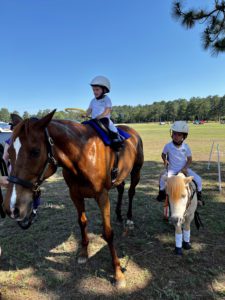
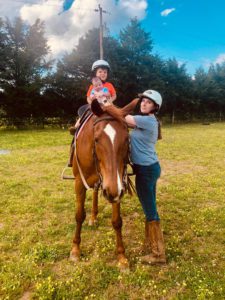
Are there any exercises, drills, or training techniques you could share for up-and-coming players who want to emulate your partnership on the field?
Rahul: There is so much that goes into getting your horse going well that it’s hard to isolate just one or two things. That said, your horse needs to be able to move all of its body parts freely with minimal resistance (both sides). To me, you can never have a horse that’s too soft, so as a start, I always encourage folks to work on their horses lateral flexion (the vertical will come with time)….think lots of bending and moving body parts around as you get them to be more free and soft. The importance of ground work can not be stressed enough! From there, move to mounted and start at a standstill then progress into a walk, trot, canter, gallop. Once you can move all of its parts at any given speed, the rest will come.
Another tip and pet peeve of ours is seeing beginners or youngsters stick and balling their horses too much (specifically with hard stops/spins/marking up/etc). You want your horse to enjoy and look forward to games, so don’t fry them by overdoing things. Yes you should practice stick work daily, but that can be done on the ground (or even on a bicycle!). If you’re lucky enough to have more than one horse, you have the luxury of being able to rotate which ones you stick and ball on, and when you do so, stick to the basics like pickups/bounces/10 yards/passing all on a loose rein and moving out freely (versus constant hard stops/spins/etc…….you can save those for your club practice chukkas).
My recommendation would be to ask players that you respect for help and guidance. They’d be glad to help. At the end of the day, the most important thing is to be patient and know that things won’t just magically come overnight. You have to have the desire and be willing to put in the effort on a daily basis if you want to see results. Be sure that “the rules don’t change” and remember that “being consistently consistent” will take you and your horse a long ways.
Sarah: Do your ground work!!! Watch videos and take as many clinics as you can from a variety of trainers and players. You never know what tip you’ll pick up on that will help a random topic “click”. What works for one horse won’t necessarily work for another, so you have to have multiple tools and approaches. Make the expectations clear and practice consistency. Most of all, get out and spend time in the saddle. Ride as many different horses as you can and ride as much as you can. Not only will this improve your riding, but you might get the opportunity to feel how a certain horse goes or does a particular move differently and be able to then take it back home to work on with your own horse.
Thank you to the Desai family for participating in this post! Rahul and Sarah are both APA Certified Clinicians who can teach your group about polocrosse! Their home club is hosting a “Come Try Polocrosse” day on July 17th in Pinehurst, NC if you are local to the area and are interested in trying out this sport. Rahul is also a Bombers rep and can help you with any equipment needs.
